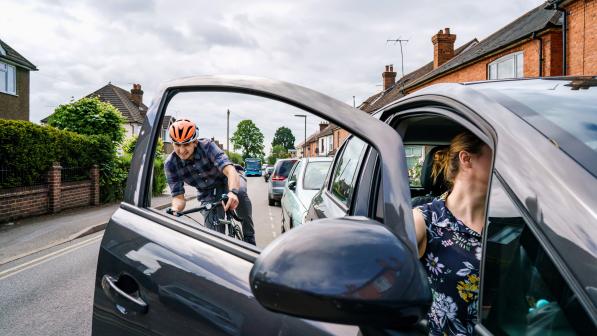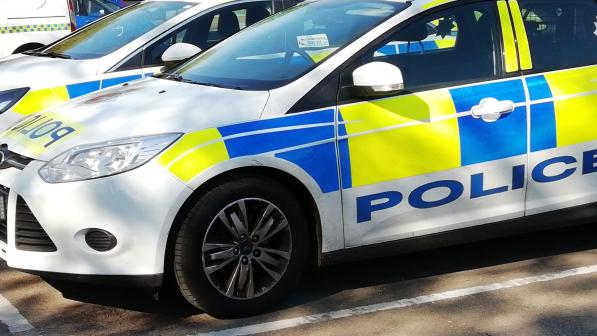Cycling UK asks MPs to seize opportunity to fix our failing laws

Cycling UK is upping the fight for Road Justice, following the publishing of its Five Flaws: Failing Laws report, which highlights key changes which Parliament could make into law via the Police, Crime, Sentencing and Courts Bill, and which would help fix our broken justice system.
Now, Cycling UK has written to all MPs in Scotland, Wales, and England, urging them to come together in support of key amendments which would make our roads safer (road traffic laws are largely devolved in Northern Ireland, and are a matter for the Northern Ireland Assembly).
Write to your MP ask them to support the amendments
The amendments (N20 and N21), tabled by Ben Bradshaw MP, would fix two of the five failing laws identified in Cycling UK’s report, but cross-party support from the backbenches will be needed if these changes are to become law.
The first proposal would close the loophole which means drivers who flee the scene of a collision face the same maximum penalty for ‘hit and run’ – just 6 months’ custody – whether they scrape a car’s paintwork in a car park and drive off, or leave someone for dead on the roadside.
Although drivers can be prosecuted for other crimes when they injure or kill someone, the loophole means that where there no evidence available to establish ‘careless’ or ‘dangerous’ driving, the only offence available to prosecutors is often ‘failing to stop’, with a trivial maximum penalty of 6-months’ custody. This is a travesty, especially given that fleeing the scene inevitably affects the evidence which can be gathered from the scene.
The amendment, which will be considered by MPs in the coming weeks, would create a new criminal offence of ‘Failing to stop or report accidents involving actual or potential serious or fatal injury’, carrying a maximum penalty of 14 years’ custody where a driver flees the scene when they knew, or ought reasonably to have realised, that a collision had caused serious or fatal personal injury.
Rather than focussing on the exceptional hardship potentially caused by a driving ban, we should think about the exceptional hardship suffered by victims of road crime
Duncan Dollimore, Head of Campaigns, Cycling UK
The second amendment would close the ‘exceptional hardship’ loophole, which allows drivers to avoid a driving ban after accruing 12 penalty points, by claiming that this would cause them ‘exceptional hardship’. The current legislation fails to define what ‘hardship’ is truly ‘exceptional’, and as a result the loophole is routinely used to avoid bans: as of December 2019, 10,652 people retained valid licences, despite having 12 or more points on their licence, making a mockery of the term ‘exceptional’.
The impact of this loophole was made tragically clear by the death of Lee Martin, who was killed in 2015 by a driver who had avoided a driving ban - despite being caught using his phone at the wheel eight time - by pleading that it would cause him ‘exceptional hardship’.
The proposals before Parliament would set out a definition of what truly amounts to ‘exceptional hardship’, advising courts that the hardship suffered “should be regarded as exceptional if and only if it is significantly greater than the hardship that would arise for a large majority of other drivers’.
This would end the routine acceptance of pleas which enable drivers to avoid a ban, even though they chose to risk their licence, and other people’s safety, by committing – in most cases – a series of driving offences.
Highlighting this rare opportunity to fix our failing laws, Cycling UK has written to MPs across the House of Commons, reminding MPs that each one of them represents people whose lives have been ripped apart by road crime, and asking that they support these amendments, save lives and keep dangerous drivers off the road.
Now, members so the public also have the to write to them MP to seek their support before the Bill reaches the report stage on Monday 5 July, using Cycling UK’s online action.
Write to your MP today to support our campaign
As the Bill passes through Parliament and moves to the House of Lords, Cycling UK will be reaching out to Lords to seek further amendments to tackle the other failing laws.
Commenting on the amendments, Duncan Dollimore, Head of Campaigns at Cycling UK, said: “Rather than focussing on the exceptional hardship potentially caused by a driving ban, we should think about the exceptional hardship suffered by victims of road crime when offenders are given chance after chance to keep their licence yet go on to offend again.
Harm caused to others should trump the predictable consequences of accruing penalty points, and the fact that it doesn’t is an insult to victims that makes a mockery of our road traffic laws. It’s time to fix the fatal flaws in those laws, and this should matter to every MP, because they’ll all have constituents whose lives have been ripped apart by road crime.”





